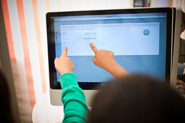Materiality and technological mediation
Psychologists have long shown a keen interest in the development of thought and language, sometimes forgetting that this development occurs within in a material environment. On a daily basis, we do not only interact with people, but also with multiple objects and socio-material contexts. What are the strategies developed by a little girl trying to tinker with a cardboard plane? How will the way in which tables are arranged in a class promote or hinder the interactions between students? Objects sometimes resist our attempts to manipulate them, surprise us, direct and constrain our actions. These material elements thus become actors participating in human development and learning. Among these elements, technologies constitute a particularly interesting domain because of the role they play in our society, the possibilities they allow, and the constraints they pose to psychological activity. How do grandparents take ownership of new technologies to stay connected to their families or restore a network of diminished interpersonal relationship during their retirement years? How does the use of platforms transform learning modalities in universities? What do children think of robots and their reliability when they seem to "reason" and when they "give controversial opinions"? Focusing on physical and technological materiality opens up an infinite world of questions and deepens our understanding of psychological processes.
List of projects
Childhood
- La construction sociale des pratiques de propriété chez l'enfant
- Informal learning in a summer out-of-school play-scheme for children to build solar toys
Adulthood
Getting older



